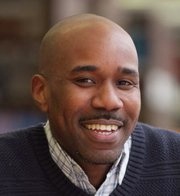"Now the serpent was more subtle than any beast of the field which the Lord God has made. And he said unto the woman, Yea, hath God said, Ye shall not eat of every tree of the garden? And the woman said,unto the serpent, We may eat of the fruits of the trees of the garden: but of the fruit of the tree which is in the midst of the garden, God hath said, Ye shall not eat of it neither shall ye touch it lest ye die. And the serpent said unto the woman, Ye shall not surely die..." - Genesis 3:1-4
"For sin, seizing an opportunity through the commandment, deceived me and through it [the commandment] killed me" - Romans 7:11 (ESV)
"Forbidden things have a secret charm" - Tacitus
(I was challenged by this devotion by M. Craig Barnes; thought I'd share it with you....just something to think about)
When we think of "forbidden fruit" what usually comes to mind are things that are bad for us - alcohol, adultery, the corruption of wealth and power. But forbidden fruit may also signify something we've yearned for that God has not chosen to give us: the success just beyond our grasp, a dream we've chased most of our lives, a relationship with a particular person.
It's easy to obsess about this thing we don't or cannot have -- this forbidden tree standing in the midst of everything else God has given us. In fact, what we "don't have" has a way of overshadowing all our other gifts. With this yearning comes sin: a choice to re-create our lives after our own image of goodness. Along the way, we may tell ourselves all kinds of lies, not the least of which is that we can be our own creators. Judging God's work in our lives to be too slow or too fast, too dull or too frightening, we reach for something more than we were ever created to have.
Significantly, when the serpent found Adam and Eve, they were standing by the forbidden tree. I wonder if, like us, they spent a lot of time staring at that tree. There are so many trees that we can freely enjoy, but we fixate on the one that is missing. Tragically, when we reach for that which is beyond our created limits, we lose the Garden of Eden -- often filled with a family, a job, and a lifestyle that really was good enough -- it was paradise! But we didn't realize that until we lost it.
It's not that we should never dream or try to improve our lives, but we can and should resist the temptation to be consumed by our yearning. In the end, the question we must always ask is: "Am I in the center of God's will for my life?"
What do you think?
Pastor Andrew Smith
[email protected]
"For sin, seizing an opportunity through the commandment, deceived me and through it [the commandment] killed me" - Romans 7:11 (ESV)
"Forbidden things have a secret charm" - Tacitus
(I was challenged by this devotion by M. Craig Barnes; thought I'd share it with you....just something to think about)
When we think of "forbidden fruit" what usually comes to mind are things that are bad for us - alcohol, adultery, the corruption of wealth and power. But forbidden fruit may also signify something we've yearned for that God has not chosen to give us: the success just beyond our grasp, a dream we've chased most of our lives, a relationship with a particular person.
It's easy to obsess about this thing we don't or cannot have -- this forbidden tree standing in the midst of everything else God has given us. In fact, what we "don't have" has a way of overshadowing all our other gifts. With this yearning comes sin: a choice to re-create our lives after our own image of goodness. Along the way, we may tell ourselves all kinds of lies, not the least of which is that we can be our own creators. Judging God's work in our lives to be too slow or too fast, too dull or too frightening, we reach for something more than we were ever created to have.
Significantly, when the serpent found Adam and Eve, they were standing by the forbidden tree. I wonder if, like us, they spent a lot of time staring at that tree. There are so many trees that we can freely enjoy, but we fixate on the one that is missing. Tragically, when we reach for that which is beyond our created limits, we lose the Garden of Eden -- often filled with a family, a job, and a lifestyle that really was good enough -- it was paradise! But we didn't realize that until we lost it.
It's not that we should never dream or try to improve our lives, but we can and should resist the temptation to be consumed by our yearning. In the end, the question we must always ask is: "Am I in the center of God's will for my life?"
What do you think?
Pastor Andrew Smith
[email protected]

 RSS Feed
RSS Feed


